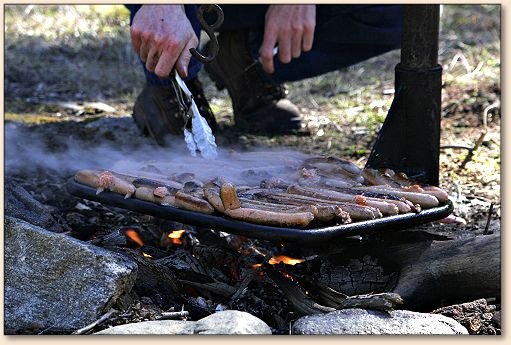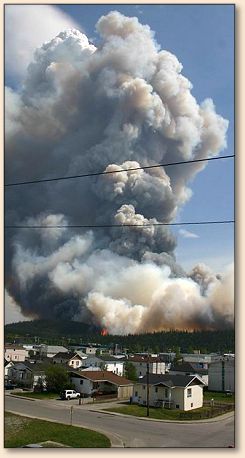The Camp Fire
By Chris Chin, Bay Comeau, Quebec, Canada
For those of us who are lucky enough to have access to wilderness
fishing, the camp fire is a tradition. What shore lunch would be
complete without a bushel of Walleye fillets deep fried along side
some skillet potatoes?
On Canadian rivers, a lone camp fire perched on a rocky point is
a beacon to neighbouring anglers to paddle over for a cup of java;
an opportunity to share some time, some stories and perhaps exchange
some river reports. Morning coffee perked over an open fire just
seems to smell and taste better.

A batch of Snags over an open fire
Unfortunately, as with most any privilege, there is a fair share
of responsibility. In 1983, two European tourists were camping
and fishing on Parrott Lake, South West of Houston in British
Columbia. They had built a make shift smoker to cure some of
their catch. A few moments of inattention and flames (according
to witnesses) burst out of the small structure.
Long story short, the Swiss Fire eventually burned over 45,000
acres of forested lands and is still considered one BC's most
serious wild fires. Fifty families were evacuated during the
blaze. Some 800+ firefighters were implicated in the battle.
Over 70 bulldozers, skidders and other various machines were
trucked in and three camps were set up to house the personnel.
On a lighter side, an evacuated young couple was actually
married in camp and helicoptered out for their honeymoon.
A few moments of inattention.
Before heading out, check with the local authorities as to the
fire danger rating. One can start at:
If you decide to build a camp fire, there are some very basic rules
to follow:

* choose your site carefully.
* prepare your campfire by removing all leaves, twigs and other
flammable material from the area.
* use a designated fire pit or build a ring of rocks at least
three metres from shrubs, structures and debris.
* keep your fire under control and prevent it from sparking into
surrounding bushes and tress.
* never leave your campfire unattended
Further, in backwoods setting, if possible, use established fire pits
where others have already (safely) built fires. Keep a water source
at hand in case a wayward ember starts a spot fire.
To extinguish the fire, coals, rocks and bits of un-burnt wood should
be cool to the touch. Yes, you WILL have to get your hands dirty to
make sure you fire is truly out.
You can enjoy a camp fire in the outdoors. Just remember that the privilege
has its share of responsibility. Wild fires are a terrifying event. Do you
wish to be the cause of one?
The photo on the right is the Chibougamau fire in July 2005. Many
thanks to our Southern cousins from Maine and New York who were
dispatched up here to lend a hand. ~ Christopher Chin - St-Severin de Prouxville (Quebec)
Credits: Campfire photo from the Yukon Government
web site: https://www.community.gov.yk.ca/firemanagement/cmp.php
About Chris:
Chris Chin is originally from Kamloops,
British Columbia. He has been fly fishing
on and off ever since he was 10 years old.
Chris became serious about the sport within
the last 10 years.
"I'm a forest engineer by day and part time
guide on the Ste-Marguerite River here in
central Quebec. I've been fishing this river
for about 10 years now and started guiding
about 5 years ago when the local guide's
association sort of stopped functioning."
Chris guides mostly for sea run brook trout
and about 30% of the time for Atlantic Salmon.
"I often don't even charge service fees, as
I'm more interested in promoting the river
than making cash. I like to get new comers
to realize that salmon fishing is REALLY for
anyone who cares to try it. Tradition around
here makes some of the old clan see Salmon
fishing as a sport for the rich. Today our
shore lunches are less on the cucumber sandwich
side and more toward chicken pot pie and Jack
Daniel's."
Chris is 42 years old as of this writing. He
is of Chinese origin although his parents were
born and raised in Jamaica. He has a girlfriend,
Renée. "She and her 12 year old son Vincent
started fly fishing with me in October 2002."
To learn more about the Ste-Marguerite River,
visit Christopher's
website https://pages.videotron.com/fcch/.
Our Man In Canada Archives
|

